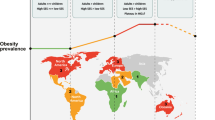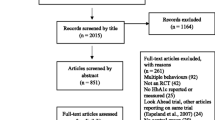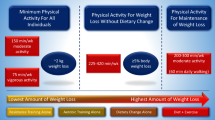Abstract
Bariatric surgery is an effective treatment for patients with severe or moderate obesity; however, long-term studies have identified that weight regain occurs post-operatively among a portion of patients. The underlying factors that influence weight regain following bariatric surgery are multifactorial and include endocrine/metabolic alterations, anatomic surgical failure, nutritional indiscretion, mental health issues, and physical inactivity. The extent and significance of these factors is currently uncertain and likely varies between individuals and the operative procedure performed. Multiple observational and non-randomized studies and a few randomized controlled trials have been reported that focus on improving post-operative weight loss. Across all of the behavioral and group support studies, patients in the treatment groups showed either no benefit or modestly greater weight loss than patients in the control groups. There are no randomized controlled trials that have specifically targeted weight regain. Additional clinical research is needed to identify etiological factors and interventional strategies.
Similar content being viewed by others
References
Papers of particular interest, published recently, have been highlighted as: • Of importance •• Of major importance
Puzziferri N, Nakonezny PA, Livingston EH, Carmody TJ, Provost DA, Rush AJ. Variation of weight loss following gastric bypass and gastric band. Ann Surg. 2008;248(2):233–42.
Benoit SC, Hunter TD, Francis DM, Cruz-Munoz DL. Use of bariatric outcomes longitudinal database (BOLD) to study variability in patient success after bariatric surgery. Obes Surg. 2014;24:936–43.
Courcoulas AP, Christian NJ, Belle SH, Berk PD, Flum DR, Garcia L, et al. Longitudinal Assessment of Bariatric Surgery (LABS) Consortium. Weight change and health outcomes at 3 years after bariatric surgery among individuals with severe obesity. JAMA. 2013;310(22):2416–25. Report of 3-year change in weight and select health parameters after common surgical procedures. LABS is a prospective observational cohort study of 2458 patients who underwent bariatric surgery.
Christou NV, Look D, MacLean LD. Weight gain after short- and long-limb gastric bypass in patients followed for longer than 10 years. Ann Surg. 2006;244(5):734–40.
Shah M, Simha V, Garg A. Review: long-term impact of bariatric surgery on body weight, comorbidities, and nutritional status. J Clin Endocrinol Metab. 2006;91(11):4223–31.
Sjostrom L, Lindroos AK, Peltonen M, Torgerson J, Bouchard C, Carlsson B, et al. Lifestyle, diabetes, and cardiovascular risk factors 10 years after bariatric surgery. N Engl J Med. 2004;351:2683–93.
Karmali S, Brar R, Shi X, Sharma AM, de Gara C, Birch DW. Weight recidivism post-bariatric surgery: a systematic review. Obes Surg. 2013;23:1922–33. Excellent review of articles published prior to 2013 regarding potential causative and modifiable risk factors related to weight regain post-bariatric surgery.
Puzziferri N, Rosheck TB, Gallegher R, Gallagher R, Belle SH, Livingston EH. Long-term follow up after bariatric surgery. A systematic review. JAMA. 2014;312:934–42. Up-to-date systematic review of effectiveness of bariatric surgery on weight loss and comorbidities.
Chang SH, Stoll CRT, Song J, Varela JE, Eagon CJ, Colditz GA. The effectiveness and risks of bariatric surgery. An updated systematic review and meta-analysis, 2003-2012. JAMA Surg. 2014;149:275–87. Up-to-date systematic review of 164 bariatric surgery studies that included 161,756 patients out to 5-year follow-up.
Van de Laar AWJM, Acherman YIZ. Weight loss percentile charts of large representative series: a benchmark defining sufficient weight loss challenging current criteria for success of bariatric surgery. Obes Surg. 2014;24:727–34.
Ochner CN, Gibson C, Shanik M, Geliebter A. Changes in neurohormonal gut peptides following bariatric surgery. Int J Obes. 2011;35:155–66.
Ionut V, Burch M, Youdim A, Bergman RN. Gastrointestinal hormones and bariatric surgery-induced weight loss. Obesity. 2013;21(6):1093–103.
Miras AD, le Roux CW. Mechanisms underlying weight loss after bariatric surgery. Nat Rev Gastroenterol Hepatol. 2013;10:575–84. Excellent review of the mechanisms through which bariatric surgery facilitates weight loss, including 130 references.
Bohdjalian A, Langer FB, Shakeri-Leidenmuhler S, Gfrerer L, Ludvik B, Zacheri J, et al. Sleeve gastrectomy as sole and definitive bariatric procedure: 5-year results for weight loss and ghrelin. Obes Surg. 2010;20(5):535–40.
Yousseif A, Emmanuel J, Karra E, Millet Q, Elkalaawy M, Jenkinson AD, et al. Differential effects of laparoscopic sleeve gastrectomy and laparoscopic gastric bypass on appetite, circulating acyl-ghrelin, peptide YY3-36 and active GLP-1 levels in non-diabetic humans. Obes Surg. 2014;24:241–52.
Sumithran P, Prendergast LA, Delbridge E, Purcell K, Shulker A, Kriketos A, et al. Long-term persistence of hormonal adaptation to weight loss. N Engl J Med. 2011;365:1597–604.
Meguid MM, Glade MJ, Middleton FA. Weight regain after roux-en-Y: a significant 20 % complication related to PYY. Nutrition. 2008;24:832–42.
Yimcharoen P, Heneghan HM, Singh M, Brethauer S, Schauer P, Rogula T, et al. Endoscopic findings and outcomes of revisional procedures for patients with weight recidivism after gastric bypass. Surg Endosc. 2011;25:3345–52.
Heneghan HM, Yimcharoen P, Brethauer SA, Kroh M, Chand B. Influence of pouch and stoma size on weight loss after bypass. Surg Obes Relat Dis. 2012;8:408–15.
Zalesin KC, Franklin BA, Miller, Nori Janosz KE, Veri S, Odom J, et al. Preventing weight regain after bariatric surgery: an overview of lifestyle and psychosocial modulators. Am J Lifestyle Med. 2010;4(2):113–20.
Rusch MD, Andris D. Maladaptive eating patterns after weight loss surgery. Nutr Clin Pract. 2007;22:41–9.
Saunders R. “Grazing”: a high-risk behavior. Obes Surg. 2004;14:98–102.
Colles SL, Dixon JB, O'Brien PE. Grazing and loss of control related to eating: two high risk factors following bariatric surgery. Obesity. 2008;16(3):615–22.
Kofman MD, Lent MR, Swencionis C. Maladaptive eating patterns, quality of life, and weight outcomes following gastric bypass: results of an internet survey. Obesity (Silver Spring). 2010;18(10):1938–43.
Chapman C, Benedict C, Brooks S, Schioth HB. Lifestyle determinants of the drive to eat: a meta-analysis. Am J Clin Nutr. 2012;96(3):492–7.
Bond DS, Phelan S, Leahey TM, Hill JO, Wing RR. Weight loss maintenance in successful weight losers; surgical versus non-surgical methods. Int J Obes. 2009;33(1):173–80.
Odom J, Zalesin KC, Washington TL, Miller WW, Hakmeh B, Zaremba D, et al. Behavioral predictors of weight regain after bariatric surgery. Obes Surg. 2010;20:349–56.
American Psychiatric Association. Diagnostic and statistical manual of mental disorders. 5th ed. Washington, DC: American Psychiatric Association; 2013.
Toussi R, Fujioka K, Coleman KJ. Pre- and post surgery behavioral compliance, patient health, and post bariatric surgical weight loss. Obesity (Silver Spring). 2009;17(5):996–1002.
Beck NN, Mehlsen M, Stoving RK. Psychological characteristics and associations with weight outcomes two years after gastric bypass surgery: postoperative eating disorder syndromes are associated with weight loss outcomes. Eat Behav. 2012;13(4):394–7.
Kalarchian MA, Marcus MD, Wilson GT, Labouvie EW, Brolin RE, LaMarca LB. Binge eating among gastric bypass patients at long term follow-up. Obes Surg. 2002;12(2):270–5.
Wadden TA, Faulconbridge LF, Jones-Corneille LR, Sarwer DB, Fabricatore AN, Thomas JG, et al. Binge eating disorder and the outcomes of bariatric surgery at one year: a prospective, observational study. Obesity. 2011;19:1220–8.
de Zwaan M, Mitchell JE, Howell LM, Monson N, Swan-Kremeier L, Crosby RD, et al. Characteristics of morbidly obese patients before gastric bypass surgery. Compr Psychiatry. 2003;44(5):428–34.
Allison KC, Wadden TA, Sarwer DB, Fabricatore AN, Crerand CE, Gibbons LM, et al. Night eating syndrome and binge eating disorder among persons seeking bariatric surgery: prevalence and related features. Surg Obes Relat Dis. 2006;2:153–58.
Hsu LK, Benotti PN, Dwyer J, Roberts SB, Satzman E, Shikora S. Nonsurgical factors that influence the outcome of bariatric surgery: a review. Psychosom Med. 1998;60(3):338–46.
Karlsson J, Taft C, Rydén A, Sjostrom L, Sullivan M. Ten year trends in health related quality of life after surgical and conventional treatment for severe obesity: the SOS intervention study. Int J Obes. 2007;31:1248–61.
Sheets CS, Peat CM, Berg KC, White EK, Bocchieri-Ricciardi L, Chen EY, Mitchell JE. Post-operative psychosocial predictors of outcome in bariatric surgery. Obes Surg. 2015;25(2):330–45. This recent review summarizes the post-operative psychological predictors of weight loss among bariatric surgery patients, which include post-operative eating behavior and adherence to dietary and physical activity recommendations.
Elfhag K, Rossner S. Who succeeds in maintaining weight loss? A conceptual review of factors associated with weight loss maintenance and weight regain. Obes Rev. 2005;6:67–85.
Jacobi D, Ciangura C, Couet C, Oppert JM. Physical activity and weight loss following bariatric surgery. Obes Rev. 2011;12(5):366–77.
Wouters E, Larsen J, Zijlstra H, van Ramshorst B, Geenen R. Physical activity after surgery for severe obesity: the role of exercise cognitions. Obes Surg. 2010;20:1–6.
King WC, Hsu JY, Belle SH, Courcoulas AP, Eid GM, Flum DR, et al. Pre- to postoperative changes in physical activity: report from the longitudinal assessment of bariatric surgery-2 (LABS-2). Surg Obes Relat Dis. 2012;8:522–32. This study examined the pre- to post-operative changes in objectively measured physical activity in large cohort of adults undergoing surgery.
Bond DS, Jakicic JM, Unick JL, Vithiananthan S, Pohl D, Roye GD, et al. Pre- to postoperative physical activity changes in bariatric surgery patients: self report vs. objective measures. Obesity. 2010;18(12):2395–7.
Rosenberger P, Henderson K, White M, Masheb RM, Grilo CM. Physical activity in gastric bypass patients: associations with weight loss and psychosocial functioning at 12-month follow-up. Obes Surg. 2010;2:1–6.
Livhits M, Mercado C, Yermilov I, Parikh JA, Dutson E, Mehran A, et al. Exercise following bariatric surgery: systemic review. Obes Surg. 2010;20:657–65.
Grontved A, Hu FB. Television viewing and risk of type 2 diabetes, cardiovascular disease, and all cause mortality: a meta analysis. JAMA. 2011;305:2448–55.
Bankoski A, Harris TB, McClain JJ, Brychta RJ, Caserbotti P, Chen KY, et al. Sedentary activity associated with metabolic syndrome independent of physical activity. Diabetes Care. 2011;34:497–503.
Bond DS, Unick JL, Jakicic JM, Vithiananthan S, Pohl D, Roye GD, et al. Objective assessment of time spent being sedentary in bariatric surgery candidates. Obes Surg. 2011;21:811–4.
Unick JL, Bond DS, Jakicic JM, Vithiananthan S, Ryder BA, Roye GD, et al. Comparison of two objective monitors for assessing physical activity and sedentary behaviors in bariatric surgery patients. Obes Surg. 2012;22:347–52.
Bond DS, Thomas JG, Unick JL, Raynor HA, Vithiananthan S, Wing RR. Self-reported and objectively-measured sedentary behavior in bariatric surgery candidates. Surg Obes Relat Dis. 2013;9(1):123–8.
Rudolph A, Hilbert A. Post-operative behavioral management in bariatric surgery: a systematic review and meta-analysis of randomized controlled trials. Obes Rev. 2013;14:292–302. Summary and meta-analysis of behavioral programs for post-operative weight loss published prior to September, 2012.
Beck NN, Johannsen M, Stoving RK, Mehlsen M, Zachariae R. Do postoperative psychotherapeutic interventions and support groups influence weight loss following bariatric surgery? A systematic review and meta-analysis of randomized and nonrandomized trials. Obes Surg. 2012;22(11):1790–7.
Papalazarou A, Yannakoulia M, Kavouras SA, Komesidou V, Dimitriadis G, Papakonstantinou A, et al. Lifestyle intervention favorably affects weight loss and maintenance following obesity surgery. Obesity. 2010;18(7):1348–53.
Sarwer DB, Moore RH, Spitzer JC, Wadden TA, Raper SE, Williams NN. A pilot study investigating the efficacy of postoperative dietary counseling to improve outcomes after bariatric surgery. Surg Obes Relat Dis. 2012;8(5):561–8.
Kalarchian MA, Marcus MD, Courcoulas AP, Cheng Y, Levine MD, Josbeno D. Optimizing long-term weight control after bariatric surgery: a pilot study. Surg Obes Relat Dis. 2012;8(6):710–5.
Kushner RF, Neff LM. Surgery for severe obesity. In: Rippe JM, editor. Lifestyle medicine. 2nd ed. London: CRC Press; 2013. p. 571–81.
Swenson BR, Schulman AS, Edwards MJ, Gross MP, Hedrick TL, Weltman AL, et al. The effect of a low-carbohydrate, high-protein diet on post laparoscopic gastric bypass weight loss: a prospective randomized trial. J Surg Res. 2007;142:308–13.
Nijamkin MP, Campa A, Sosa J, Baum M, Himburg S, Johnson P. Comprehensive nutrition and lifestyle education improved weight loss and physical activity in Hispanic Americans following gastric bypass surgery: a randomized controlled trial. J Acad Nutr Diet. 2012;112:382–90.
Lier HO, Biringer E, Stubhaug B, Tangen T. The impact of preoperative counseling on postoperative treatment adherence in bariatric surgery patients: a randomized controlled trial. Patient Educ Couns. 2012;87:336–42.
Ogden J, Hollywood A, Pring C. The impact of psychological support on weight loss post weight loss surgery: a randomized control trial. Obes Surg 2014; published online 09 September 2014.
Compliance with Ethics Guidelines
ᅟ
Conflict of Interest
Robert F. Kushner and Kirsten Webb Sorensen declare that they have no conflict of interest.
Human and Animal Rights and Informed Consent
This article does not contain any studies with human or animal subjects performed by any of the authors.
Author information
Authors and Affiliations
Corresponding author
Additional information
This article is part of the Topical Collection on Obesity Prevention
Rights and permissions
About this article
Cite this article
Kushner, R.F., Sorensen, K.W. Prevention of Weight Regain Following Bariatric Surgery. Curr Obes Rep 4, 198–206 (2015). https://doi.org/10.1007/s13679-015-0146-y
Published:
Issue Date:
DOI: https://doi.org/10.1007/s13679-015-0146-y




